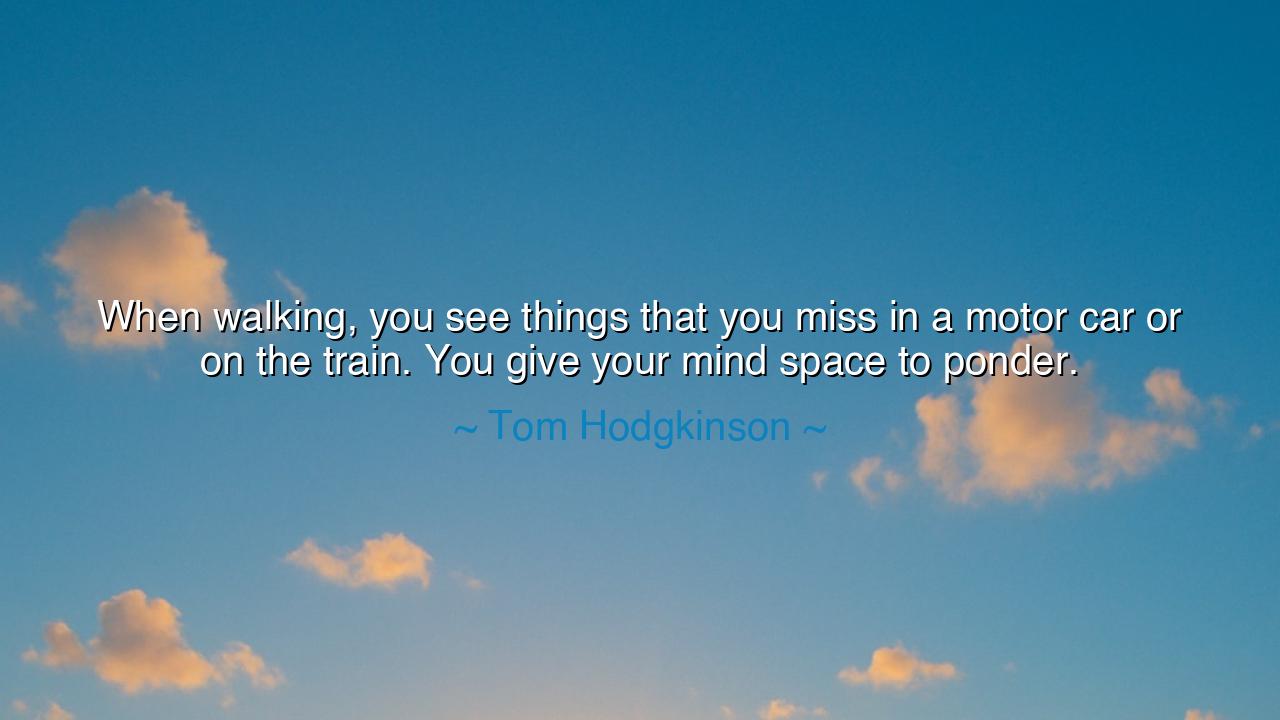
When walking, you see things that you miss in a motor car or on
When walking, you see things that you miss in a motor car or on the train. You give your mind space to ponder.






Hear now the words of Tom Hodgkinson, a seeker of simplicity and champion of the free spirit: “When walking, you see things that you miss in a motor car or on the train. You give your mind space to ponder.” Though uttered in our present age, these words carry the same quiet majesty that once flowed through the teachings of sages and poets. They remind us that life’s richest treasures often lie in the pauses, in the still pace of the foot upon the earth, and not in the swift rush of engines that devour the hours.
The meaning is clear and yet profound. In walking, the soul finds a rhythm aligned with nature. Each step is a heartbeat of the earth, each breath a communion with the air. To rush by in a motor car or upon the train is to fly past the tapestry of creation, blind to the colors and textures that make the world sacred. It is only in the slow pace of the journey that the eye notices the flower growing between stones, the child’s laughter carried by the wind, the subtle patterns of sunlight upon leaves. Walking opens not only the eyes but also the spirit.
Consider the great Aristotle, who was known to teach his disciples while walking the shaded pathways of Athens. The very name of his school, the Peripatetics, comes from this noble habit of pacing the earth while unfolding the mysteries of philosophy. For the wise of old knew that thought does not always flow in the confines of the chair or the walls of the study. The body in movement awakens the mind in motion, and thus the soul rises to ponder questions that sit heavy when we remain still.
In contrast, think of the clamor of modern travel. The train thunders past the countryside, the car cages us in glass and steel. Our eyes become mere passengers, our minds numbed by speed. The very inventions that promise freedom often bind us in haste, stripping us of the quiet gift of reflection. And so Hodgkinson calls us back, not to reject these marvels, but to remember that wisdom is found in slowness. He summons us to honor the journey itself, not merely the destination.
The lesson is not only of nature but of the heart. When you walk, your mind is given space—space to breathe, space to ponder, space to discover truths that lie hidden beneath the noise of constant motion. Many of the world’s greatest visions were born in solitude and in the quiet of such walks: Wordsworth wandering the English hills, shaping poetry from the silence; Nietzsche striding through the Alps, his philosophy rising from the mountains like thunder. These are not accidents but eternal patterns: the moving body kindles the moving soul.
Therefore, beloved listener, learn from this. Do not surrender every hour to the rush of the machine. Let some days be marked by deliberate walking. Walk through your city, and you will hear its forgotten whispers. Walk through the fields, and you will rediscover the song of the earth. In your walking, let the small things speak to you: the uneven stone, the changing sky, the faces of strangers who cross your path. These are teachers as much as any book or sermon.
Practical wisdom flows from this truth: begin with but a small habit. Each day, let your feet carry you for a while without haste, without purpose save the joy of being present. Leave behind the glowing screens and the tyranny of timetables. Breathe deeply, look widely, listen attentively. In so doing, you will find your mind grows fertile, your heart grows still, and your life becomes a little more your own.
Take this as the seed of practice: the one who walks with open eyes and a pondering heart lives not twice as long, but ten times as deeply. For it is not the number of days that measure a life, but the depth of seeing and the breadth of thought. And walking, slow and unhurried, is the doorway into such depth.






AAdministratorAdministrator
Welcome, honored guests. Please leave a comment, we will respond soon